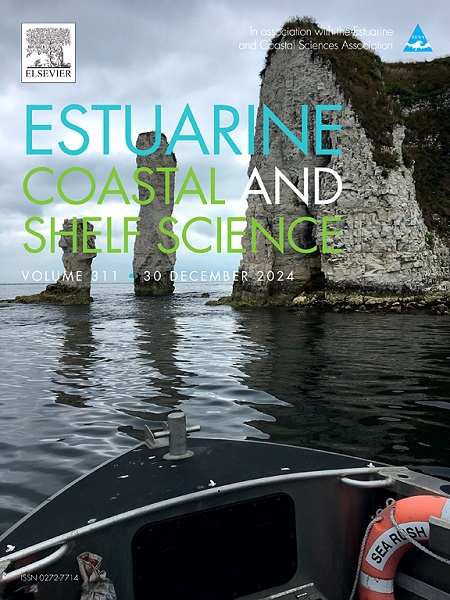Detrital source diversity moderates decomposition and nutrient release in current and future ocean conditions
IF 2.6
3区 地球科学
Q1 MARINE & FRESHWATER BIOLOGY
引用次数: 0
Abstract
The complex interactions between detrital diversity and ocean climate change are not well understood. Here, we used sixteen outdoor raceways to test the hypothesis that ocean warming, and acidification would increase rates of decomposition and nutrient release from detritus of common macroalgae, but the magnitude of change would vary for single detrital sources compared to mixed sources. Our litter-bag experiment to test this hypothesis had six types of macroalgal detritus: (i) Ecklonia radiata, (ii) Sargassum vestitum, (iii) Caulerpa filiformis, (iv) Ecklonia and Sargassum mix, (v) Ecklonia and Caulerpa mix, and (vi) Sargassum and Caulerpa mix. The experimental design also had an orthogonal set of treatments testing effects of ocean warming and acidification, individually and combined, based on the RCP 8.5 climate model for 2081–2100. The identity of detrital sources significantly influenced decomposition rates, carbon liberation and nutrient release. The treatments with two detrital sources did not have increased rates of decomposition and nutrient release compared to single sources. However, detrital source mixing significantly moderated variation in decomposition and nutrient release rates. While ocean acidification had little effect on the decomposition of macroalgal detritus, ocean warming tended to increase rates of decomposition. Given that excessive decomposition can lead to severe anoxia, the results suggest the risk of this occurring will be greater in the warmer oceans of coming decades. In such circumstances, the moderating force of detrital diversity may become increasingly important in maintaining benthic oxygen concentrations and detritus-based production.

求助全文
约1分钟内获得全文
求助全文
来源期刊
CiteScore
5.60
自引率
7.10%
发文量
374
审稿时长
9 months
期刊介绍:
Estuarine, Coastal and Shelf Science is an international multidisciplinary journal devoted to the analysis of saline water phenomena ranging from the outer edge of the continental shelf to the upper limits of the tidal zone. The journal provides a unique forum, unifying the multidisciplinary approaches to the study of the oceanography of estuaries, coastal zones, and continental shelf seas. It features original research papers, review papers and short communications treating such disciplines as zoology, botany, geology, sedimentology, physical oceanography.

 求助内容:
求助内容: 应助结果提醒方式:
应助结果提醒方式:


